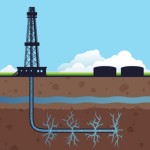An expert in tracking leaking methane from oil and gas wells says a groundbreaking U.S. federal study on hydraulic fracturing highlights not only an old and growing problem, but the need for tighter regulations in the shale gas industry.
“The shale gas boom combined with hydraulic fracking will cause wellbores to leak more often than run-of-the-mill conventional wells,” says Karlis Muehlenbachs, a geochemist at the University of Alberta. “The problem is going to get worse, not better.”
EPA’s recent report on Pavillion, Wyoming, concluded that: ”Surface casing of gas production wells do not extend below the maximum depth of domestic wells in the area of investigation.” That means methane, which is lighter than air, could leak or migrate up the wellbore towards shallower domestic water wells.
Muehlenbachs, said that they’ll frack each well up to 20 times. “Each time the pressure will shudder and bang the pipes in the wellbore. The cement is hard and the steel is soft. If you do it all the time you are going to break bonds and cause leaks. It’s a real major issue.”
However, according to EnCarta Oil and Gas, the chemicals that EPA found in test wells drilled to understand drinking water problems near Pavillion, Wyoming, were not used in hydraulic fracturing. The explanation of EnCarta is given in this recent news article. The company will be providing more details about the chemicals in question in comments on the draft report during the 45-day comment period that ends January 27, 2012.

